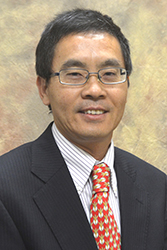
-
Qingwu Xue
- Professor, Faculty Fellow
Crop Stress Physiology - Office:
- Amarillo
- Email:
- [email protected]
- Phone:
- 806-354-5803
- Graduate Education
- Ph.D. Agronomy (Agricultural Meteorology), University of Nebraska, 2000
Professional Summary
Specialty: Crop Stress Physiology
Research
My research has been focused on improving yield, water use, WUE and stress resistance/tolerance in major crops in the Texas High Plains. The Texas High Plains is one of the most productive agricultural regions in the U.S. Because of the semi-arid climate, drought is the most common factor limiting yield and WUE in crop production, even under irrigation conditions. In addition to drought, other abiotic (e.g., heat, cold) and biotic (e.g., disease, insects) stresses frequently interact with drought for reducing crop yields and WUE in the region. Based on the above background, we have conducted experiments to address the following research objectives: (1) understand physiological mechanisms for improved abiotic stress tolerance and increased WUE; (2) identify plant traits conferring stress tolerance; (3) develop phenotyping tools for screening stress tolerance and WUE; (4) optimize crop water use and WUE through the identification of new and improved cultivars/species, best management practices, and cropping systems. In most cases, my research is conducted as a part of multidisciplinary team that includes crop physiologists, breeders, geneticists, agronomists, irrigation engineers, soil scientists, plant pathologists and entomologists.
In most cases, my research is conducted as a part of multidisciplinary team that includes crop physiologists, breeders, geneticists, agronomists, irrigation engineers, soil scientists, plant pathologists and entomologists.
Support Staff
Kirk E. Jessup, Sr. Research Associate